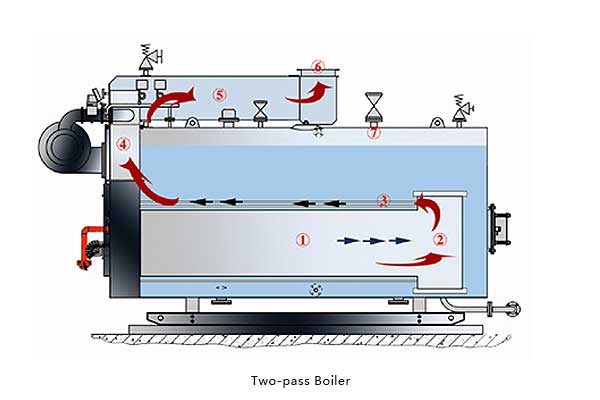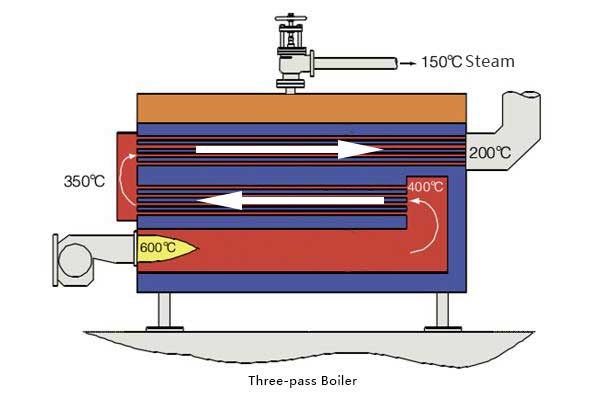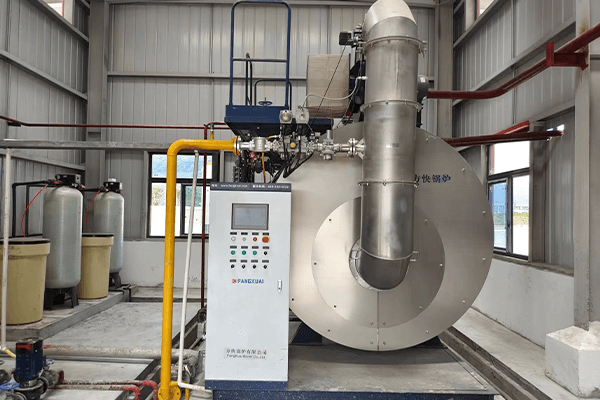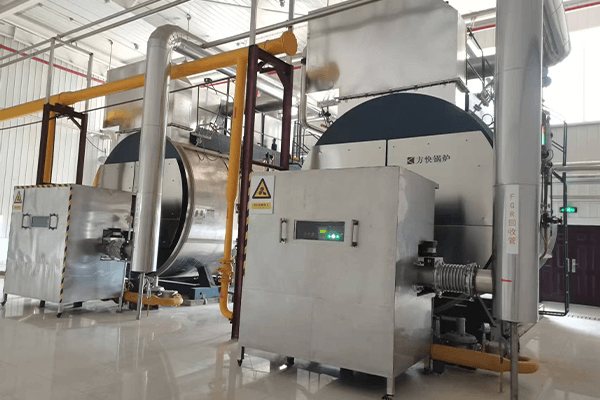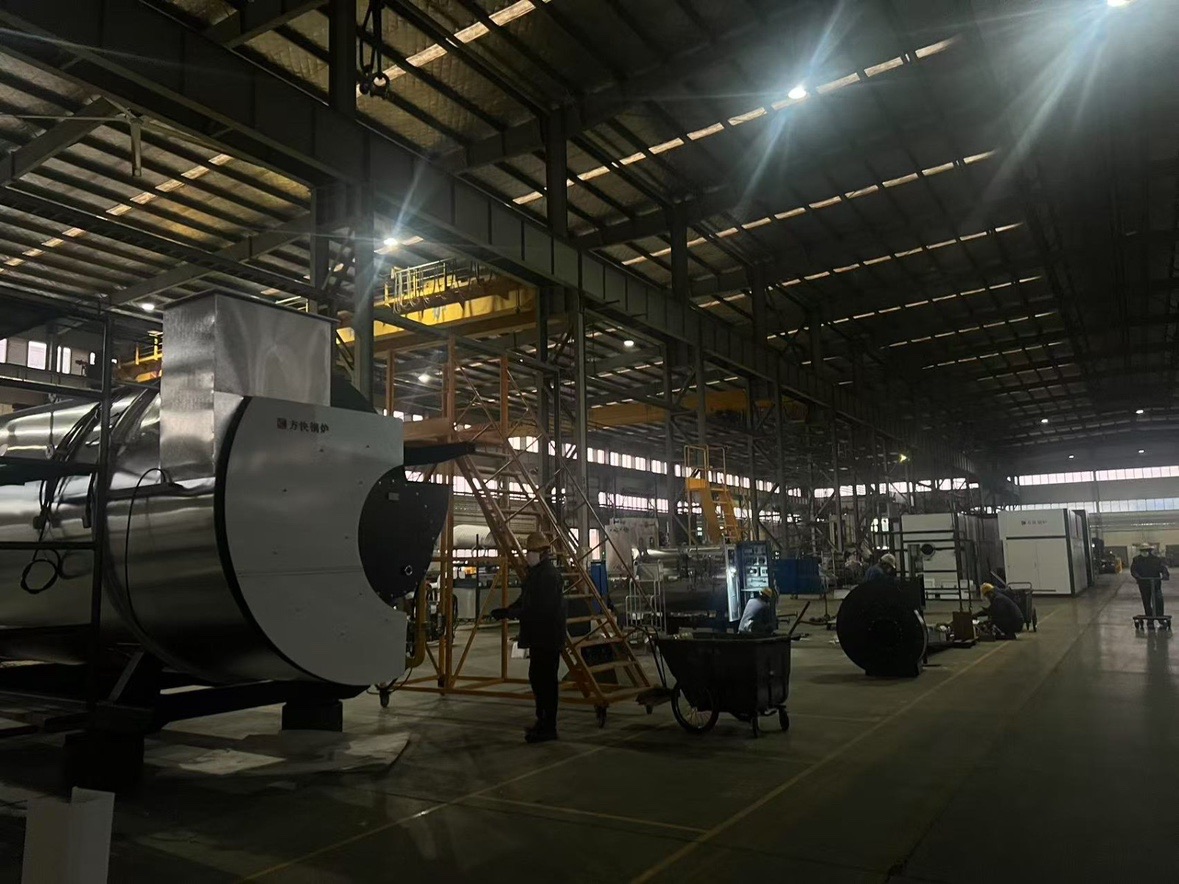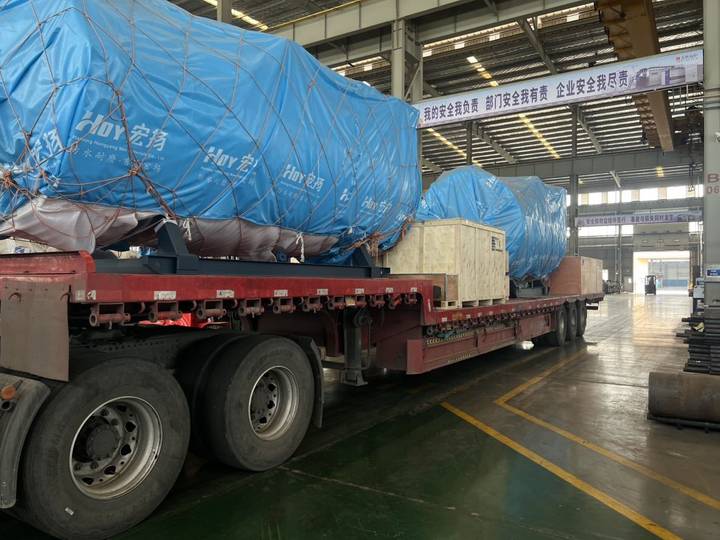What is a Two-pass Boiler?
A two-pass boiler is a fire-tube boiler design where hot combustion gases make two journeys, or “passes,” through the boiler before exiting through the chimney.
-
First pass: gases flow through the furnace tube directly from the burner.
-
Second pass: gases are redirected through a set of fire tubes surrounded by water, transferring more heat before being released.
This simple configuration makes the two-pass boiler compact and cost-effective. It is often chosen for small to medium applications such as commercial heating or light industrial use. While a two-pass boiler may not achieve the same level of efficiency as a three-pass boiler, it offers easy installation, straightforward maintenance, and reliable operation for lower load requirements.
What is a Three-pass Boiler?
A three-pass boiler extends the gas path by introducing a third reversal of combustion gases inside the boiler shell.
-
First pass: the burner sends gases into the furnace tube.
-
Second pass: gases flow through a bundle of fire tubes, transferring significant heat.
-
Third pass: gases are redirected again through additional tubes, maximizing contact with the boiler water before exiting.
This design increases surface area, lengthens the heat-transfer path, and reduces stack temperature. The result is higher boiler efficiency and lower fuel consumption. Because of these benefits, three-pass boilers are widely used in heavy-duty applications such as manufacturing plants, hospitals, food processing, and chemical industries.
(Flue gas will be recycled through the economizer to recover heat)
Two-pass Boiler vs Three-pass Boiler: Key Differences
When comparing a two-pass boiler vs three-pass boiler, several clear distinctions appear:
-
Efficiency: a three-pass boiler extracts more heat from combustion gases, lowering fuel costs over time.
-
Cost: a two-pass boiler generally has a lower purchase price and simpler construction.
-
Footprint: both designs are compact, but the three-pass boiler often achieves higher capacity without a larger shell size.
-
Durability: the three-pass design distributes heat more evenly, reducing stress on metal surfaces.
In short, a two-pass is suitable for basic applications, while a three-pass provides stronger performance for demanding industrial environments.
FangKuai two-pass boiler – steam boiler
Two-pass Boiler vs Three-pass Heat Transfer Principles
The performance difference between a two-pass boiler and a three-pass boiler comes down to heat-transfer science.
-
In a two-pass, gases contact the water surfaces twice, limiting the total energy extracted.
-
In a three-pass, gases travel a longer distance through more tubes, which increases turbulence and improves convection.
This extended exposure time leads to lower flue gas temperatures and better overall energy use. In practice, the extra pass means a three-pass boiler can often deliver 2–5% higher thermal efficiency compared to a two-pass boiler, depending on fuel type, burner settings, and maintenance.
FangKuai three-pass boilers – steam boiler
Design Differences and Practical Advantages
Two-pass Boiler Design
-
Straightforward structure with fewer gas reversals.
-
Lower initial cost and simpler tube layout.
-
Well-suited for small systems or where budget is limited.
Three-pass Boiler Design
-
More complex gas routing with additional reversal chambers.
-
Increased heat-transfer surface area and lower stack loss.
-
Better suited for continuous operation in energy-intensive industries.
From a design perspective, the extra pass in a three-pass boiler may increase fabrication complexity, but it offers significant long-term savings in energy and fuel use.
Two-pass Boiler and Three-pass Boiler Operation and Maintenance
Operation and maintenance differ between a two-pass and a three-pass:
-
Two-pass boiler maintenance: easier access, fewer surfaces to clean, and reduced inspection time.
-
Three-pass boiler maintenance: more heating surfaces require cleaning, but with proper design, access doors and inspection points simplify the process.
In practice, the efficiency gain of a three-pass boiler often outweighs the slightly higher maintenance effort. Regular inspections, burner tuning, and tube cleaning are essential for both types of boilers to maintain optimal efficiency.
How to Choose Between Two-pass Boiler and Three-pass Boiler
Choosing between a two-pass boiler and a three-pass boiler depends on several factors:
-
Application size: smaller systems benefit from two-pass, while larger industrial plants favor three-pass.
-
Fuel cost: if fuel prices are high, investing in a three-pass boiler quickly pays off through savings.
-
Operation hours: facilities running boilers continuously will gain more from the efficiency of a three-pass design.
-
Budget and space: two-pass fit tighter budgets, while three-pass require a slightly higher initial investment.
-
Lifecycle cost: always evaluate not just the purchase cost, but also long-term fuel, maintenance, and downtime costs.
Conclusion
Both the two-pass boiler and the three-pass boiler adopt a proven fire-tube design with distinct advantages. The two-pass boiler is cost-effective, simple in structure, and highly reliable, making it suitable for smaller installations. The three-pass boiler, on the other hand, offers higher efficiency, lower fuel consumption, and better long-term performance.
When choosing a boiler, please consider your application requirements, expected operating hours, and total lifecycle cost. Contact us, and we will customize the most suitable boiler solution according to your needs.
Two-pass Boiler And Three-pass Boiler FAQ
Q: Which is more efficient, a two-pass boiler or a three-pass boiler?
A: A three-pass boiler is generally more efficient because it has a longer flue gas path and greater heat-transfer surface area. This design lowers exhaust temperature, improves boiler efficiency, and reduces fuel consumption compared to a two-pass boiler.
Q: Do three-pass boilers require more maintenance than two-pass boilers?
A: A three-pass does have more heating surfaces to inspect and clean, which can mean slightly more maintenance. However, modern three-pass designs include access doors and inspection points that make cleaning relatively easy, and the efficiency savings usually outweigh the additional effort.
Q: Which boiler type lasts longer, a two-pass boiler or a three-pass boiler?
A: Both two-pass boilers and three-pass boilers can have long lifespans if properly maintained. However, a three-pass may enjoy longer service life because its design distributes heat more evenly, reducing metal stress and extending the durability of the pressure vessel.
Q: How should I decide between a two-pass boiler vs a three-pass boiler for my facility?
A: The decision depends on operating hours, fuel costs, and efficiency requirements. If your facility runs continuously and fuel savings are critical, a three-pass is usually the better choice. If you only need moderate output and prefer lower capital investment, a two-pass may be the most practical solution.
Get your best price
Quickly compare 3 FREE quotes
- Engineer quick quote
- The overall delivery speed is fast
- Financial choice
- Low installation costs and cost savings
25 years+ of boiler R&D
More than 20 innovative technologies

